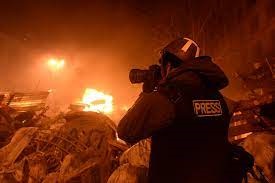By Yazmin Beltran
Journalism is a dangerous job for many in the profession.
United Nations labeled journalism as one of the most dangerous jobs in the world. A report released by the United Nations Education, Scientific and Cultural Organization highlights that while casualties related to countries experiencing armed conflict have declined, fatal attacks against journalists covering stories on corruption, human-rights violations, environmental crimes, trafficking and political wrongdoing have risen in other countries.
“Journalists shine light into dark places, uncover injustices, give voice to the voiceless, among other things,” said Jennifer Mitchell, College of Southern Nevada professor of journalism. “This deeply upsets those in power who don’t want their secrets uncovered. Journalists are on the front line to provide the truth. Some don’t want the truth out.”
A new report released by the Committee to Protect Journalists highlights the continuing trend of journalist murders going unanswered. The report titled “CPJ’s 2022 Global Impunity Index” highlights facts and figures of the number of journalists killed in the last 10 years. In nearly 80% of the 263 cases of journalists murdered in retaliation for their work globally over the past decade, the perpetrators have faced no punishment. So far in 2022, more than 60 journalists and media workers have been killed around the world.
According to the CPJ, Mexico is one of the most egregious cases. CPJ has documented 28 unsolved journalist murders there in the past 10 years—the most of any country on the Index and the Western Hemisphere’s most dangerous for journalists. At least 13 journalists were killed in Mexico this year. At least three of those journalists were murdered in direct retaliation for their reporting on crime and political corruption.
According to Craig LaMay, journalism professor at Northwestern University, even though journalists are relatively safe in the United States, there are other parts of the world where journalism is being criminalized. “Mexico is ground zero for journalism. It is a dangerous profession because there, you have not just the government but significant private powers often aligned with the government that engage in violence towards journalists.”
CSN journalism Professor Jeff Hein agreed with the UN report and attributes another factor that can contribute to violence against journalists in the United States. “I think journalism is one of the most dangerous professions in the world because so many countries don’t allow free speech like we do in the United States. I also believe that it is more and more dangerous in the United States because of our volatile political environment combined with the public’s access to social media.”
Journalism matters, Mitchell said. “If it weren’t for journalists, what would we know. Think about it. What would you know about Ukraine, Russia and Washington D.C.? It is because of the courageous folks who go out there to do the job of journalism to serve the public.”
“I work to instill the high calling of journalism,” Mitchell added. “I want my students to do the job well with accuracy, transparency, verifiability, primary sources, great facts, context, discussion and to write it well. I hope they will be the top of the profession serving the public and I hope they never forget their allegiance is to the people.”
The American Press Institute wrote that the more democratic a society, the more news and information it tends to have. Uncovering big stories can cost a reporters’ lives but journalists have a duty to inform.





